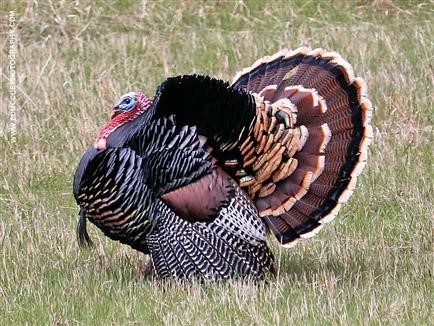It’s OK to Give a Pardon or to Get One Too!
It’s OK to Give a Pardon or to Get One Too! -Day 411 - Daily Content Challenge
The Wild Turkey is a ground bird native to North America. It is the ancestor of the domestic turkey which originally came from Mexico. Native people in Mexico had domesticated the Wild Turkey centuries before European explorers arrived in the early 1500’s. These explorers brought home Wild Turkeys and they quickly became a popular item on European menus. When English colonists settled on the Atlantic Coast, they brought domesticated turkeys with them.
Wild Turkeys are very large, plump birds. They have long legs, wide, rounded tails, and a small head on a long, slim neck. These birds eat many pesky insects. Having a flock of turkeys nearby can be an ideal method of pest control for your yard.
Wild Turkeys forage for food by walking on the ground. They will scratch in leaf litter to expose food items and sometimes climb in shrubs or trees to eat berries. They are most active in the early morning and evening. Their diet varies but it is mostly plant material, including many acorns, leaves, seeds, grains, berries, buds, grass blades, roots and bulbs. They also eat insects, spiders, snails and sometimes frogs, lizards, snakes, salamanders and crabs.
In the spring, the male makes a gobbling call to attract females. In courtship, the males puff out their feathers, raise and spread their tail, swell up their face wattles, and strut while rattling their wing feathers and making humming sounds. One male will mate with several females.
Their nest is on the ground at the base of a tree, or under a shrub or in tall grass. The nest is a shallow depression and is sparsely lined with grass and leaves. Usually the female lays 10-15 eggs. The eggs are white to pale buff and dotted with reddish brown spots. Sometimes more than one female will lay eggs in the same nest.
Male Wild Turkeys provide no parental care. The female sits on the eggs to incubate them for 25-31 days. The downy young leave the nest soon after hatching and they follow the female who feeds them for a few days until they have learned to find food on their own.
As the chicks grow, they band into groups. These groups are composed of several hens and their broods. The young can make short flight at the age of one or two weeks, but they are not full-grown for several months. By tucking their wings in close, spreading their tails, and kicking, turkeys can swim when they need to.
Wild Turkeys have several predators. Coyotes, bobcats, raccoons, mountain lions, Golden Eagles and Great Horned Owls all like to prey on Wild Turkeys. Raccoons, opossums, skunks, foxes, woodchucks, snakes, birds and rodents like to steal the eggs from their nests. Hunters love to hunt them as game birds.
Wild Turkey numbers dwindled through the early twentieth century. People began to look for ways to reintroduce this game bird. At first they tried to release farm turkeys into the wild but those birds did not survive. In the 1940s, people began catching wild turkeys and releasing them to other areas. This enabled Wild Turkeys to spread to all the lower states and Hawaii and southern parts of Canada.
Turkeys are gentle creatures who enjoy socializing with humans and protecting other turkeys. They may attempt to dominate or attack people that they view as subordinates. This happens most often during breeding season. Turkeys may respond aggressively and peck at shiny objects like windows because they see their own reflection and think it is an intruding turkey.
These are some sayings that I picked out that I think a Wild Turkey might tell us.
-
Strut Your Stuff - the male turkey likes to strut and show off to attract the females. Let people know what you have to offer and share your experiences with others.
-
Spread a Little Happiness - Wild turkeys join together in flocks with their siblings and their moms. Spend time together with family during this Thanksgiving holiday.
-
Live with the Seasons - Wild Turkeys eat a variety of things depending on the seasons. They enjoy all four seasons of the year.
-
Be an Early Bird - Wild turkeys are most active in the early morning. Get up early and start your day with activities that get you moving forward.
-
Be Kind to Your Mother - The females are the caregivers for their young. Your mom loves you too. Don’t forget to spend time with your family this holiday season.
-
It’s OK to get a Pardon! - The Pardon Turkey named Chocolate and his substitute named Chip received a Pardon at the White House this week. Chocolate and Chip will retire to North Carolina State University in Raleigh, NC.
Turkeys are associated with the Thanksgiving holiday. Are you having turkey for your Thanksgiving Dinner? Or Are you giving them a Pardon by leaving them off your plate this year?
Have a great day everyone. It’s OK to Give a Pardon or to Get One Too!
# living life abundantly # published author # travelling tuesdays



